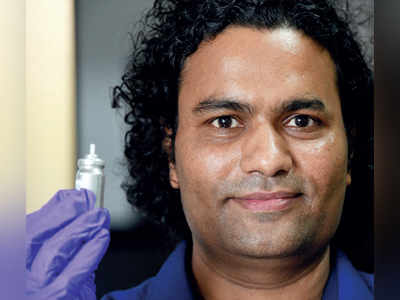IIT’s Anti-TB ‘inhaler’ Drug creates new hope for faster recovery
 The first phase of trials of the research by four national institutes for cutting down the duration of tuberculosis treatment has shown a remarkable success. The research is being conducted by Indian Institute of Bombay, along with National Institute of TB & Respiratory Diseases, New Delhi, National Jalma Institute of Leprosy and Other Mycobacterial Diseases in Agra, and the Delhi-based Indian Council of Medical Research.
The first phase of trials of the research by four national institutes for cutting down the duration of tuberculosis treatment has shown a remarkable success. The research is being conducted by Indian Institute of Bombay, along with National Institute of TB & Respiratory Diseases, New Delhi, National Jalma Institute of Leprosy and Other Mycobacterial Diseases in Agra, and the Delhi-based Indian Council of Medical Research.
IIT Bombay is running clinical trials with the other three institutions, of a breakthrough medicine that aims at treating multi-drug resistance (MDR) and killing the bacteria in the lungs more quickly, if taken along with the regular medication. The study is being funded by city-based Tata Trusts (Rs 2 crore) and the ministry of human resource development (Rs 2.5 crore).
The research raises new hope for the TB patients since it would significantly shorten the current two-year treatment. Current MDR treatment includes 16 tablets a day and daily injections for the first six months. According to the researchers, the new easy administration would thus persuade more patients to complete their course of medication.
The research began in the last year and the first phase of the trials has been completed at the National Institute of Tuberculosis and Respiratory Diseases, New Delhi. Dr. Vinay Saini, a senior scientist from the department of biosciences and bioengineering at IIT-B who is part of the research, said pulmonary TB comprises a majority of MDR cases. “A drug that can be inhaled can go directly to the lungs, which can help kill the bacteria faster.” He also added that trial results have been remarkable.
The researchers didn’t disclose the composition of the drug. They said it is largely herbal and, therefore, its side effects are close to nil. Contraindications of the current TB medication range from persistent gastritis to loss of hearing and depression. Although it’s still in its beginning stage, the drug’s cost is expected to be significantly lower than the current medication, which can set an MDR-TB patient back by Rs 1.75 lakh.
Prof. Rohit Shrivastava, a member of the research team said animal testing will begin soon. Since IIT B doesn’t have such a facility, they are planning to conduct trials on mice at the National Jalma Institute of Leprosy and Other Mycobacterial Diseases. If the tests turn out to be a success, hey will move on to bigger animals, like rabbits and chimpanzees, and finally, on MDR patients at the Sewri TB hospital. The animal trials are expected to be complete by the next year.
IIT-B has also developed a cost-effective kit to detect the disease in two to three hours from urine, blood and sputum samples in coordination with Sewri TB hospital. Each kit will cost Rs.65.
The kits will be available at the Sewri TB hospital once after getting approval from BMC’s ethical committee.